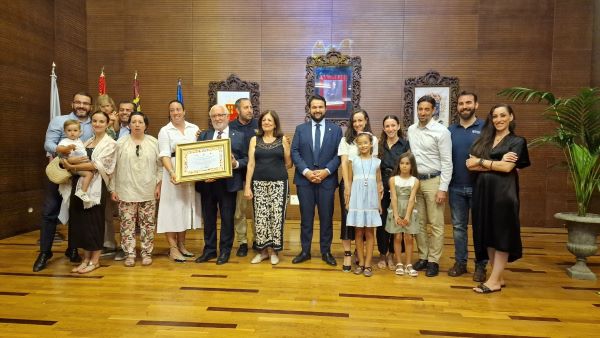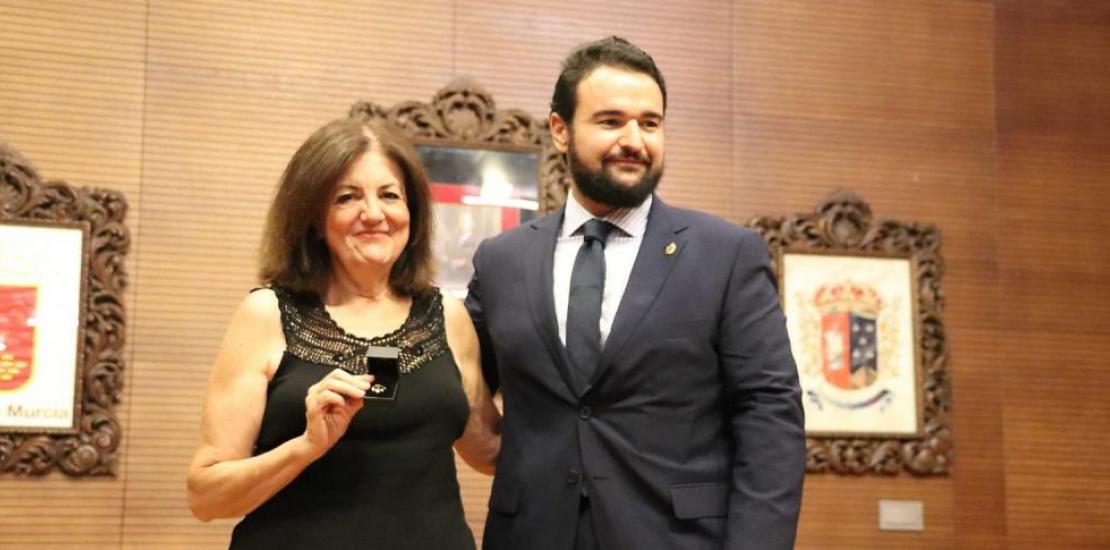The Castillete de Oro Is Sent to Heaven in the Name of José Luis Mendoza
• His widow, María Dolores García, current President of the Universidad Católica, received the highest award of the International Festival of Cante de las Minas surrounded by his children and the warmth of the town of La Unión. • `The alliance with the UCAM is one of the best things that has happened to this Festival’, remarked Joaquín Zapata, highlighting the boost to flamenco training and research provided by the Chair in Flamencology.
The cultural programme of the 62nd International Festival of Cante de las Minas came to an end with the final award, the Castillete de oro, which was sent to heaven in the name of José Luis Mendoza. The Cante de las Minas Foundation, chaired by Joaquín Zapata, sought to reward the founder of the UCAM for his defence of flamenco and the invaluable work he did for this Festival, which led to the creation of the Chair in Flamencology. ‘He must be smiling in heaven watching how La Unión remembers him once more and knocks on his door to ask him for the tenacity and passion with which he lived his life’, said Zapata.
He was the one to present his widow, María Dolores García Mascarell, with this Castillete de Oro, which she received with the support of her family and deeply moved: ‘since José Luis left me, my spirit feels every act in which he is present’. ‘This is a tribute to José Luis and all his work, and in this particular case to his support and love for flamenco and the Cante de las Minas’, were her words.

The UCAM President, as well as Francisco Bernabé, Senator of the Kingdom of Spain, recalled how José Luis was: a person who devoted himself to what he believed in. ‘Nothing held him back; he went into everything with all his heart.’ His Andalusian roots were to blame for his immediate connection with flamenco and, therefore, with the Cante de las Minas. Thanks to the Chair, whose director was the cantaora Estrella Morente, the Festival could travel to Japan, India and Brussels, and it also supported training and research.
Bernabé recalled the moment the idea was brought to him in his office and how he did not hesitate to say yes, making the dream of supporting flamenco with more research and training become a reality. ‘All of that was possible thanks to a man who believed in this project’, added Bernabé, stressing that with this recognition ‘La Unión is saying loud and clear that it is proud of José Luis Mendoza.’ He stated that this was ‘the first step of many more to come’ and said that he hoped that the work he had begun ‘would not be forgotten and that the legacy of José Luis would continue.’
‘He had a love for flamenco in his heart that was reflected in the Chair proposal and he gave it his all’, remarked María Dolores García, offering the help of UCAM to the Festival. Joaquín Zapata praised the work of this academic institution, insisting on the fact that ‘the alliance with the UCAM is one of the best things that has happened to this Festival.’




